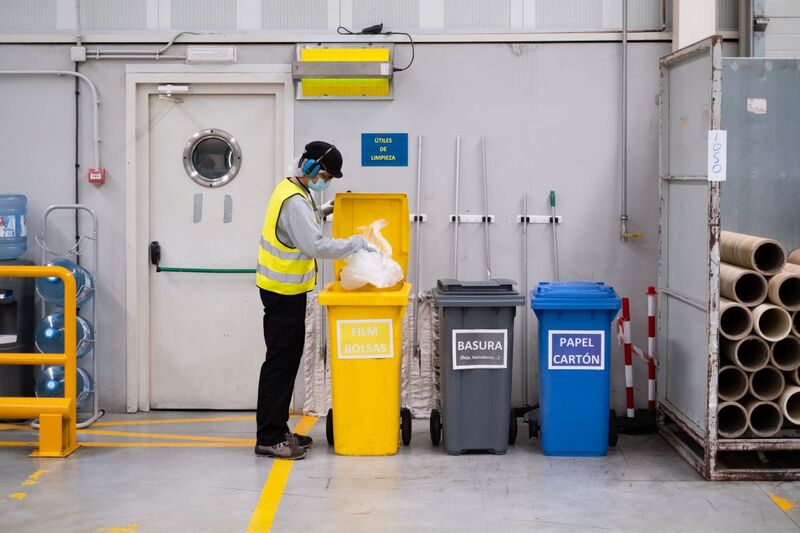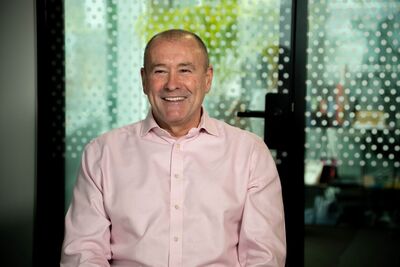Achieving zero waste to landfill: Celebrating a collaborative effort

From globally diverse operations to the COVID-19 pandemic, there were many challenges on the road to achieving zero waste to landfill. Despite this, kp’s teams rose to the challenge.
Waste generation continues to increase globally, and there are no signs of it slowing down. More than two billion metric tons of solid waste were generated worldwide in 2022, and this figure is expected to increase by roughly 70% by 20501.
With rising volumes of waste, more organisations like kp are playing their part by minimising and better managing waste traditionally destined for landfill.
With rising volumes of waste, more organisations like kp are playing their part by minimising and better managing waste traditionally destined for landfill.
Share this story
Sustainable operations are good for everyone
kp offers more than 8,000 customers an extensive portfolio of high-quality plastic packaging and related solutions. Our experts create innovative films and trays that protect medication and medical devices, keep products safe, help avoid food waste, and preserve the integrity of countless products.
We know sustainable operations are good for everyone. Our sustainability strategy, Investing in Better, includes targets linked to reducing our emissions, sending zero waste to landfill, designing for recyclability, and creating a safer place to work.
As a business, we place great emphasis on waste management strategies and our approach has delivered results:
We know sustainable operations are good for everyone. Our sustainability strategy, Investing in Better, includes targets linked to reducing our emissions, sending zero waste to landfill, designing for recyclability, and creating a safer place to work.
As a business, we place great emphasis on waste management strategies and our approach has delivered results:
- 2020: 10 sites achieved zero waste to landfill or incineration without energy recovery.
- 2022: 24 sites achieved zero waste to landfill or incineration without energy recovery.
- 2023: Reduced overall waste levels and achieved zero waste to landfill2.
With operations in 18 countries, hitting this milestone was challenging and wouldn’t have been possible without the dedication of numerous teams and a commitment to finding innovative solutions.
Benefits and challenges of zero waste to landfill
Zero waste to landfill means that all waste generated by kp’s activities is diverted away from landfill. So, either reused, recycled, composted, or sent to energy recovery.
In addition to knowing we’re a responsible organisation, this approach:
I also remember back in 2022 the local cement works that used to incinerate the Montreal site waste (for energy) temporarily shut down. This forced us to use a relief contractor at an increased cost, but we did it to stay on track with achieving zero waste to landfill.
In addition to knowing we’re a responsible organisation, this approach:
- Reduces waste disposal costs (when factoring savings vs. spend across all sites).
- Reduces reliance on landfill space.
- Reduces Scope 3 greenhouse gas emissions.
I also remember back in 2022 the local cement works that used to incinerate the Montreal site waste (for energy) temporarily shut down. This forced us to use a relief contractor at an increased cost, but we did it to stay on track with achieving zero waste to landfill.
And then there are disparities between regions in terms of regulations and waste and recycling infrastructure. However, site teams globally have all risen to the task and supported our overarching vision from the outset, for which I’m hugely grateful.
Collaborating to achieve sustainability targets
Transitioning to zero waste to landfill required a mindset shift, and the commitment of many teams to implement locally appropriate tactics to reduce waste and better manage it, in line with local and country-level legislation. These teams have collaborated with procurement, operations, management…this list goes on.
Scheduling for efficiency has been one of the major tools that’s helped us stop sending waste to landfill. I attribute a lot of our success here to the passion and determination of David Midgley, Business Excellence Manager. He’s a specialist in production planning – and with over 80,000 products and all the machinery on our production lines, that’s an epic task.
It may not be what you traditionally call sustainable thinking, but David has been supporting teams at every site to identify how we can reduce changeovers on machines throughout our production lines. This not only makes production more efficient, but it reduces energy consumption and sees less waste generated. It's a cool example of the synergy between operations and sustainability.
- In 2022, our Bukowice site recorded a decrease in tool changeovers from 155 to around 105 per month. Each changeover avoided saving start-up material in the thermoforming and extrusion processes and ultimately increased net production.
- At our Ritterhude site, the same methodology is being used to sequence the production of various tray sizes, based on customer demand, to improve production efficiency. The result is better outputs, less waste, and less supply chain risk.
David also oversaw the global implementation of a training programme delivered in five languages, remotely during the COVID-19 pandemic. We trained some 200 kp people on process efficiencies involving waste, following ‘Product Wheel’ methodology principles and practices. David ensured our planners, product managers, and wider teams saw the benefit of the project and continued to support it during a critical time for our business when there were so many other pressures falling on health and safety leads.
Top tips to achieve zero waste to landfill
- There is no one-size-fits-all solution when operating globally.
- If you believe it is possible, you’ll find a way to deliver.
- Make it personal; show how the positive outcomes will directly impact local people and their communities.
- Anticipate that sometimes the right decision will cost the business more. Be prepared to demonstrate why remaining committed to the project is the right thing to do.

“Don’t underestimate how long the mindset shift and the changes different sites will need to put into place will take. It gets easier as you get more sites over the line.”
David Midgley
Business Excellence Manager at kp
Looking to the future

Alan Richards, Chief Operating Officer and Head of Corporate Sustainability at kp
As stated in our 2025 targets, our teams are currently focused on:
- Using at least 30% post-consumer recycled material in our packaging.
- Reduce the overall waste generated annually with year over year improvement.
- Reducing Scope 1 and 2 carbon emissions by 50% (against a 2019 baseline).
I truly believe meaningful, considered investment in sustainability ultimately benefits every single product that comes off the line. And whilst we know there is still much more to be done, we’re looking forward to developing the next iteration of our ambitious sustainability strategy over the coming months.
Alan Richards
Chief Operating Officer and Head of Corporate Sustainability
Klöckner Pentaplast
More like this
Sources
1Municipal solid waste generation globally 2050 | Statista (accessed 05/03/2024)
2Where legislation allows. independent assurance statement received from DNV.
2Where legislation allows. independent assurance statement received from DNV.







